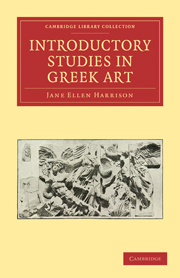Book contents
- Frontmatter
- PREFACE
- Contents
- ILLUSTRATIONS
- MAP
- CHAPTER I PREDECESSORS OF GREEK ART
- CHAPTER II CHALDÆO-ASSYRIA
- CHAPTER III PHŒNICIA
- CHAPTER IV THE METOPES OF SELINUS
- CHAPTER V PHEIDIAS AND THE PARTHENON
- CHAPTER VI THE HERMES OF PRAXITELES
- CHAPTER VII THE ALTAR OF EUMENES AT PERGAMOS
- TABLE OF REFERENCES
- Plate section
CHAPTER II - CHALDÆO-ASSYRIA
Published online by Cambridge University Press: 07 September 2010
- Frontmatter
- PREFACE
- Contents
- ILLUSTRATIONS
- MAP
- CHAPTER I PREDECESSORS OF GREEK ART
- CHAPTER II CHALDÆO-ASSYRIA
- CHAPTER III PHŒNICIA
- CHAPTER IV THE METOPES OF SELINUS
- CHAPTER V PHEIDIAS AND THE PARTHENON
- CHAPTER VI THE HERMES OF PRAXITELES
- CHAPTER VII THE ALTAR OF EUMENES AT PERGAMOS
- TABLE OF REFERENCES
- Plate section
Summary
We must leave the banks of the Nile, and, crossing the Arabian desert eastward for a thousand miles, we shall reach the mouth of another river, that flows through and fertilizes another barren land—the river Euphrates. The Nile flows northward to the Mediterranean Sea; the Tigris and Euphrates, joining their lower course, flow together southward to the Persian Gulf. As Egypt is the gift of the Nile, so Babylonia and Mesopotamia are in a lesser degree the gift of Tigris and Euphrates. But we must not press the analogy too far. It may have seemed strange to us that the earliest known civilization of the world sprang up in the most arid and barren of the continents, Africa; but there the river which flows through this land is wholly beneficent, even in its course, regular in its rise and fall. The land of the Euphrates and Tigris is a country subject to sudden storm and flood, to the reverses of extreme heat and intense cold. It is a land of violence and excess, and we shall see this character impressed upon the people's art. It is a land, too, which nature has divided far more definitely than Egypt into two parts—the hill country, at the source of the rivers, where rain falls and a certain amount of cultivation is possible apart from the riverwater, and the country of the plain, wholly the river's gift. Into these two halves the country has always fallen, politically as physically.
About these names, Assyria, Chaldæa, Babylonia, to most of us there are gathered associations as vague as they are splendid.
- Type
- Chapter
- Information
- Introductory Studies in Greek Art , pp. 40 - 70Publisher: Cambridge University PressPrint publication year: 2010



